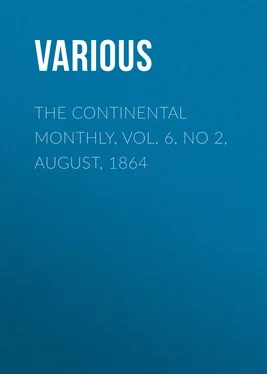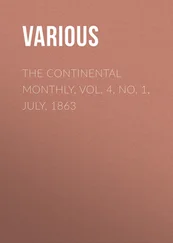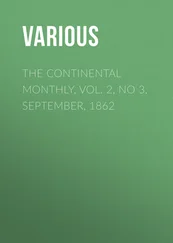Various - The Continental Monthly, Vol. 6, No 2, August, 1864
Здесь есть возможность читать онлайн «Various - The Continental Monthly, Vol. 6, No 2, August, 1864» — ознакомительный отрывок электронной книги совершенно бесплатно, а после прочтения отрывка купить полную версию. В некоторых случаях можно слушать аудио, скачать через торрент в формате fb2 и присутствует краткое содержание. Жанр: foreign_antique, periodic, Языкознание, Политика, foreign_edu, на английском языке. Описание произведения, (предисловие) а так же отзывы посетителей доступны на портале библиотеки ЛибКат.
- Название:The Continental Monthly, Vol. 6, No 2, August, 1864
- Автор:
- Жанр:
- Год:неизвестен
- ISBN:нет данных
- Рейтинг книги:4 / 5. Голосов: 1
-
Избранное:Добавить в избранное
- Отзывы:
-
Ваша оценка:
- 80
- 1
- 2
- 3
- 4
- 5
The Continental Monthly, Vol. 6, No 2, August, 1864: краткое содержание, описание и аннотация
Предлагаем к чтению аннотацию, описание, краткое содержание или предисловие (зависит от того, что написал сам автор книги «The Continental Monthly, Vol. 6, No 2, August, 1864»). Если вы не нашли необходимую информацию о книге — напишите в комментариях, мы постараемся отыскать её.
The Continental Monthly, Vol. 6, No 2, August, 1864 — читать онлайн ознакомительный отрывок
Ниже представлен текст книги, разбитый по страницам. Система сохранения места последней прочитанной страницы, позволяет с удобством читать онлайн бесплатно книгу «The Continental Monthly, Vol. 6, No 2, August, 1864», без необходимости каждый раз заново искать на чём Вы остановились. Поставьте закладку, и сможете в любой момент перейти на страницу, на которой закончили чтение.
Интервал:
Закладка:
At the head of the Sunday papers stands The Observer , founded in 1792. Like The Globe , it is extremely well informed upon all political matters, for very good reasons. It spares no expense in obtaining early news, and is an especial favorite with the clubs. The Era is the great organ of the theatrical world, but joins to that specialité the general attributes of an ordinary weekly journal. It was established in 1837. The Field , which calls itself the country gentleman's newspaper, is all that it professes to be, and a most admirable publication, treating of games, sports, natural history, and rural matters generally. It was started by Mr. Benjamin Webster, the accomplished actor manager, in 1853. But to particularize the principal papers, even in a short separate notice of a few lines, would far transgress the limits at our disposal. All the professions are well supplied with journals devoted to their interests, and it is impossible here to dwell upon them or those which represent literature and the fine arts. With regard to religious papers, their name is legion, and they would require a separate article to be fairly and honestly considered. Punch , too, and his rivals, dead and living, are in the same category, and must, however reluctantly, be passed over. Two curiosities, however, of the press must be mentioned. Public Opinion was started about two years and a half ago. It consisted of weekly extracts from the leading articles of English and foreign journals, and scraps of news, and other odds and ends. It has succeeded mainly from its cost of production being so slight, owing to its paste-and-scissors character, and also because it freely opens its columns to correspondents de rebus omnibus , who are willing to buy any number of copies for the pleasure of seeing themselves in print. The Literary Times , in addition to reviews of books, professed to criticize the leading articles in the various papers, but, after an existence of some six months or so, one Saturday morning The Literary Times was non est inventus .
In concluding this series of articles, which has run to a much greater length than he originally intended, the writer is conscious of many shortcomings and omissions, which he trusts will be pardoned and overlooked when his principal object is borne in mind. That object has been to give a general outline of the history of the press, and especially of its struggles against 'the powers which be;' and, though tempted now and again—he fears too often for the patience of his readers—to wander away into particularities, he has always endeavored to keep that object in view. Above all, he hopes he has at least been successful in showing the truth of that sentiment which was first publicly expressed as a toast at a Whig dinner, at the Crown and Anchor tavern, in 1795: 'The liberty of the press—it is like the air we breathe—if we have it not, we die!'
OUR MARTYRS
Lightly the river runs between
Hanging cliffs and meadows green.
Blackly the prison, looking down,
Frowns at its shadow's answering frown.
Shut from life in his life's fresh morn,
Crouches a soldier, wounded and worn.
Chained and starved in the dungeon grim,
Day and night are alike to him;
Save that the murmurous twilight air
Stings his soul with a deeper despair.
Day by day, as the taunting breeze
Wafts him the breath of orange trees,
He fancies in meadows far away
The level lines of odorous hay;
And sees the scythes of the mowers run
In and out of the steady sun.
Night by night, as the mounting moon
Climbs from his eager gaze too soon,
The gleams that across the gratings fall,
Broken and bright, on the prison wall,
Seem the tangles of Northern rills,
Like threads of silver winding the hills.
When, sinking into the western skies,
The sun aslant on the window lies;
And motes that hovered dusty and dim,
Golden-winged through the glory swim:
He drops his head on his fettered hands,
And thinks of the fruitful Northern lands.
Between his fingers' wasted lines,
Tear after tear into sunlight shines,
As, wandering in a dream, he treads
The ripened honey of clover heads;
Or watches the sea of yellow grain
Break into waves on the windy plain;
Or sees the orchard's grassy gloom
Spotted with globes of rosy bloom.
Through the shimmer of shadowy haze
Redden the hills with their autumn blaze.
The oxen stand in the loaded teams;
The cider bubbles in amber streams;
And child-like laughter and girlish song
Float with the reaper's shout along.
He stirs his hands, and the jealous chain
Wakes him once more to his tyrant pain—
To festered wounds, and to dungeon taint,
And hunger's agony, fierce and faint.
The sunset vision fades and flits,
And alone in his dark'ning cell he sits:
Alone with only the jailers grim,
Hunger and Pain, that clutch at him;
And, tight'ning his fetters, link by link,
Drag him near to a ghastly brink;
Where, in the blackness that yawns beneath,
Stalks the skeleton form of Death.
Starved, and tortured, and worn with strife;
Robbed of the hopes of his fresh, young life;—
Shall one pang of his martyr pain
Cry to a sleepless God in vain?
ÆNONE:
A TALE OF SLAVE LIFE IN ROME
CHAPTER X
But though Ænone's sanguinely conceived plan for Cleotos's happiness had so cruelly failed, it was not in her heart to yield to his passionate, unreflecting demand, and send him away from her, even to a kinder home than he would have found at the house of the captain Polidorus. It would but increase his ill fortune, by enforcing still greater isolation from every fount of human sympathy. Though the affection of the wily Leta had been withdrawn from him, her own secret friendship yet remained, and could be a protection to him as long as he was at her side; and in many ways she could yet extend her care and favor to him, until such time as an outward-bound vessel might be found in which to restore him to his native country.
Whether there was any instinct at the bottom of her heart, telling her that in the possibility of trying events to come his friendship might be equally serviceable to her, and that, even in the mere distant companionship of a slave with his mistress, she might feel a certain protecting influence, she did not stop to ask. Neither did she inquire whether she wished to retain him for his own benefit alone, and without thought of any happiness or comfort to be derived by her from his presence. Had she been accustomed closely to analyze her feelings, she might have perceived, perhaps, that, in her growing isolation, it was no unpleasant thing to look upon the features and listen to the tones which carried her memory back to her early days of poverty, when, except for a short interval, her life had been at its happiest. But had she known and acknowledged all this, it would not have startled her, for she would have felt that, in her heart, there was not the slightest accompanying shade of disloyalty. Her nature was not one to admit of sudden transfers of allegiance. It was rather one in which a real love would last forever. When the first romantic liking for Cleotos had consumed itself, from the ashes there had sprung no new passion for him, but merely the flowers of earnest, true-hearted friendship. And it was her misfortune, perhaps, that the real love for another which had succeeded would not in turn consume itself, but would continue to flourish green and perennial, though now seemingly fated to bask no longer in the sunshine of kindly words and actions, but only to cower beneath the chill of harsh and wanton neglect.
Читать дальшеИнтервал:
Закладка:
Похожие книги на «The Continental Monthly, Vol. 6, No 2, August, 1864»
Представляем Вашему вниманию похожие книги на «The Continental Monthly, Vol. 6, No 2, August, 1864» списком для выбора. Мы отобрали схожую по названию и смыслу литературу в надежде предоставить читателям больше вариантов отыскать новые, интересные, ещё непрочитанные произведения.
Обсуждение, отзывы о книге «The Continental Monthly, Vol. 6, No 2, August, 1864» и просто собственные мнения читателей. Оставьте ваши комментарии, напишите, что Вы думаете о произведении, его смысле или главных героях. Укажите что конкретно понравилось, а что нет, и почему Вы так считаете.












